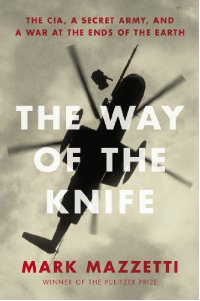'Way of the Knife': Mark Mazzetti's lively tour of the third war we've been fighting

The estimable Micah
Zenko wants a "first
draft" of "the Third War." Actually it has been written, and is
being published this week. It is The Way of the Knife,
by Mark
Mazzetti. It has all sorts of interesting details, like
that the United States has the ability to remotely turn on a cell phone in
Pakistan and then collect the precise coordinates of whoever is carrying
it.
Here is an interview I did with the author by
e-mail:
Tom Ricks: What are we going to learn from your book that
we haven't gotten from others, like those by Peter Bergen?
Mark Mazzetti: Peter's books are
absolutely terrific, and a hard act to follow! And, there have certainly been a
number of terrific books covering the war on terror. What I've tried to do in
my book is tell a story of a secret war, and how that war has changed places
like the CIA and parts of the Pentagon. The CIA is now at the center of waging
covert wars in places like Pakistan and Yemen. The agency certainly has had a
history of far flung military adventures, but then it tried to get out of the
killing business -- only to come back at it in a big way since the September 11
attacks. Meanwhile, the Pentagon has become more like the military, sending
soldiers into the dark corners of the world on spying missions. There's been a
real blurring of the lines between soldiers and spies.
With the "big wars" in Iraq and
Afghanistan either over or winding down, I think that these secret wars have
become the default way of doing business. And, only now is the pressure growing
for the White House to bring greater transparency to the shadow wars.
TR: What was the biggest surprise to you in reporting and
writing the book?
MM: I think that the biggest surprise
was how much this type of warfare brings various colorful characters to the
forefront. When the United States determined it couldn't send the 101st
Airborne into a country, it began to rely on private contractors and other
types of individuals to do things like gather intelligence on the ground. I
spent a chapter on the private spying network run by Duane Clarridge, a former
CIA officer and one of the figures in the Iran-Contra scandal. A Pentagon
official hired Clarridge's team to gather intelligence in Pakistan because
there was a belief that the CIA wasn't up to the task, but the entire operation
ended up in recriminations and a Pentagon investigation. It's stories like this
that I really tried to highlight in the book.
TR:
Why do you think
drones have become so controversial only recently in the United States?
MM: That's a good question. I think
that up until recently, at least in Washington, you had both Republicans and
Democrats uniformly supporting targeted killings and there was no constituency
calling for greater transparency and accountability for these kinds of
operations. Since the November election, you have seen Democrats become more
vocal in challenging the Obama administration on the use of targeted killings.
And, of course, there is Rand Paul's now-famous filibuster that captured
concerns among Libertarians about secret government operations.
TR: Which of our three wars (Iraq, Afghanistan, and "knife")
do you think historians ultimately will find the most significant?
MM: This might sound like I'm
avoiding giving a direct answer, but all three wars have impacted each other,
and so in some ways I think that some historians will look at this entire post-9/11
period as one that fundamentally changed both U.S. foreign policy and how the
United States conducts war. Certainly, the Obama administration has relied on
these shadow wars because it considers them cheaper, lower risk, and more
effective than the big messy wars of
occupation like Iraq and Afghanistan. But, so much of the way that an
organization like the Joint Special Operations Command does business is a
direct result of its work in both Iraq and Afghanistan. They took parts of what
they were doing in those countries and brought outside of the "hot"
battlefields.
TR: What do you think are the lessons
of this third war?
MM: There's no question that the United States has become
dramatically better at manhunting than it was on September 11, 2001. There is
better fusion of intelligence, and the Pentagon, CIA, and other intelligence
agencies are working more closely together. I think, though, that one of the
lessons is that secrecy can be very seductive and that it might be too easy for
our government to carry out secret warfare without the normal checks and
balances required for going to war. As you well know, as much as the Pentagon
can be a lumbering bureaucracy, there is a certain benefit of having a good
many layers that operations must pass through in order to get approved. When
decisions about life and death are made among a small group of people, and in
secret, there are inherent risks.
Thomas E. Ricks's Blog
- Thomas E. Ricks's profile
- 436 followers



